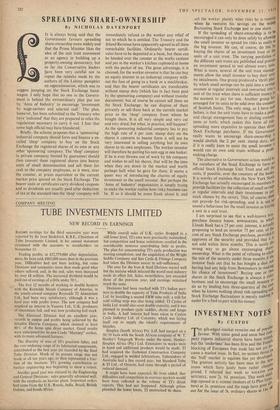SPREADING SHARE-OWNERSHIP
By NICHOLAS DAVENPORT
Briefly, the scheme proposes that a `sponsoring' industrial company should form and finance a so- called 'shop' company to buy on the Stock Exchange the registered shares of its own or any other 'sponsoring' company. The 'shop' company (a private company limited by guarantee) should then convert these registered shares into bearer units of small denomination and sell them for cash to the company employees, as it were, over the counter, at prices equivalent to the current market price quoted on the Stock Exchange. The bearer units or certificates carry dividend coupons and as dividends are usually paid after deduction of tax at the standard rate the `shop' company will
immediately refund to the worker any relief of tax to which he is entitled. The Treasury and the Inland Revenue have apparently agreed to all these remarkable facilities. Ordinarily bearer certifi- cates have to be deposited at a bank, but these can be handed over the counter at the works canteen and put in the worker's kitchen cupboard at home with the packet of tea. The great advantage, it is claimed, for the worker-investor is that he can buy an equity interest in an industrial company with- out the fuss of going to a bank or a stockbroker, and that the bearer certificates are transferable without stamp duty (which has in fact been paid by the sponsoring company) and without transfer documents; but of course he cannot sell them on the Stock Exchange; he can dispose of them privately or sell them back at the current market price to the `shop' company from whom he bought them. It is all very simple and very cut and very dried, but what, in practice, will happen? As the sponsoring industrial company has to pay the high rate of 6 per cent. stamp duty on the shares it converts to bearer form it will not be very interested in selling anything but its own shares to its own employees. The worker-investor will therefore be putting his nest-egg in one basket. If he is ever thrown out of work by his company and wishes to sell his shares, that will be the time when they are down in the market and worth perhaps half what he gave for them. It seems a queer way of introducing the charms of equity investment to the small investor. But perhaps the `Aims of Industry' organisation is simply trying to make the worker realise how risky business can be. If so it should be more frank about it, and tell the worker plainly what risks he is running when he ventures his savings on the widely fluctuating Stock Exchange and in one share.
If the spreading of share-ownership is to be encouraged it can only be done safely by allowing the small investor to spread his risks as easily as the big investor. He can, of course, do this by buying the shares of an investment trust or the units of a unit trust. The varying portfolios of the different unit trusts are published and provide an investment spread to suit almost every taste. What is more, several of the unit trust manor ments allow the small investor to buy their units, by instalments. One group produced a `thrift plan by which small savings can be paid into a savings account at regular intervals and converted into s unit of the trust when there is sufficient money in the account to pay for one. Another group has arranged for its units to be sold over the counters of Scottish banks. The only snag, as I have said before, is that the unit trusts have to make a profit and charge management fees or dealing commis' sions or both, which makes this form of risk- spreading more expenive to operate than direr' Stock Exchange purchases. If the Government really wants to encourage share-ownership it would abolish the 2 per cent. stamp duty, and if it is really keen to assist the small investor It would run its own unit trusts without a profit' making charge. The alternative to Government action would be for members of the Stock Exchange to form an official Stock Exchange Unit Trust and sell the units, if possible, over the counters of the banks; It is worthy of mention that the New York Stoo Exchange has actually encouraged its members to provide facilities for the collection of small savings at regular intervals and their investment in any stock chosen by the savers. This, of course, does not provide for risk-spreading, and it is not s° sound a behaviour for the small investor as buying a unit in a unit trust. I am surprised to see that a well-known hill; purchase finance house, BOWMAKERS, in Lloyds Bank has a 25 per cent. interest, is actually proposing to lend an investor 75 per cent, of the cost of any Stock Exchange purchase, provided is approves of the security and provided that it not sold within three months. This is surely the wrong way to go about encouraging share:, ownership. What is the point of refusing to allow the sale of the security under three months if investor finds out that he has bought a dud, not having had any help from Bowmakers in making his choice of investment? Buying one or , shares in the Stock Exchange is always a risky business and to encourage the small investor IsLt do so by lending him three-quarters of the cod when he knows nothing about risk-spreading a"it Stock Exchange fluctuations is merely making easier for a fool to part with his money.














































































 Previous page
Previous page